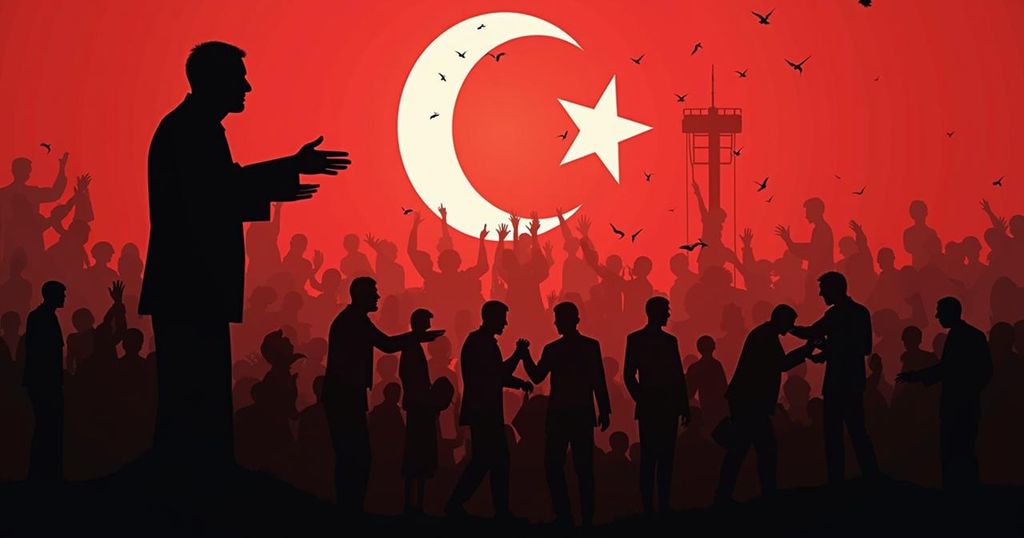Tunisia is preparing for a presidential election in which incumbent Kais Saied is predicted to win amid significant political repression. Key opposition figures are jailed, and many candidates were barred from running. This election is viewed as a critical moment following Saied’s 2021 power grab, leading to public apathy and skepticism about the electoral process. Human Rights Watch indicates widespread political imprisonment, further underscoring the authoritarian shift in Tunisia since the Arab Spring.
On Sunday, Tunisia is set to hold its presidential election amidst a climate of repression, where incumbent President Kais Saied is expected to secure another term. The electoral landscape features just two opposition candidates: a former lawmaker who previously supported Saied’s controversial power grab in 2021 and a businessman currently incarcerated. The Tunisian election commission has prohibited 14 candidates from participating, reflecting the increasing crackdown on dissent during the campaign season. The context of this election marks a significant downturn in Tunisia’s democratic aspirations, which began over a decade ago with the Arab Spring uprisings. Polling stations are scheduled to operate from 8:00 AM to 6:00 PM, with preliminary results anticipated by Wednesday. However, the electoral process has been marred by the absence of campaign rallies and public debates, with the majority of campaign posters featuring President Saied. Electoral fatigue is palpable among citizens, many of whom express a resignation toward the electoral process. A 22-year-old voter, who spoke anonymously for fear of repercussions, articulated this sentiment by stating, “We have nothing to do with politics” and expressed belief that voting would be “useless.” Since his rise to power in 2019, President Saied has enacted significant changes to the constitution while intensifying repression against dissenters. Human Rights Watch reports that over 170 individuals remain imprisoned on political charges within Tunisia. Key opposition figures, such as the head of the Ennahdha party, Rached Ghannouchi, and Abir Moussi of the Free Destourian Party, are among those detained. While the electoral body expects around 9.7 million citizens to participate, the overwhelming likelihood of a Saied victory, combined with the nation’s escalating economic crisis, has diminished electoral enthusiasm. The International Crisis Group suggested that President Saied’s nationalistic rhetoric, coupled with economic hardships, has dampened any excitement amongst the electorate. Concerns abound that a renewed mandate for Saied might exacerbate Tunisia’s socioeconomic challenges and reinforce the authoritarian path of his regime. Against this backdrop, the opposition candidates standing against Saied include Zouhair Maghzaoui, who supported the power grab, and Ayachi Zammel, a lesser-known businessman embroiled in legal troubles. In a recent address, Saied urged voters to participate en masse, framing the election as an opportunity for national reconstruction that he claims is undermined by external conspiratorial forces. The current situation highlights Tunisia’s fraught relationship with democracy and the ramifications of its electoral process during a period of notable estrangement from its revolutionary ideals.
The article discusses the prevailing conditions surrounding Tunisia’s presidential election, highlighting the political repression faced by opposition candidates and the anticipated outcome favoring incumbent President Kais Saied. In the years following the Arab Spring, Tunisia was seen as a beacon of democratic hope; however, President Saied’s consolidation of power has raised concerns over the future of democracy in the nation. Despite the fundamentals underlying a democratic process, the lack of viable opposition and the pre-election suppression have led to widespread public apathy and skepticism towards the electoral process.
Tunisia’s recent presidential election illustrates the significant challenges facing its democracy, marked by political repression and public disillusionment. With President Kais Saied poised to win another term without substantial opposition or enthusiasm from the populace, the election may serve as a pivotal moment, reflecting a pronounced departure from Tunisia’s initial post-revolution ideals. The future of democracy in Tunisia remains uncertain as the repercussions of continued authoritarian practices loom large over the nation’s political landscape.
Original Source: www.france24.com







